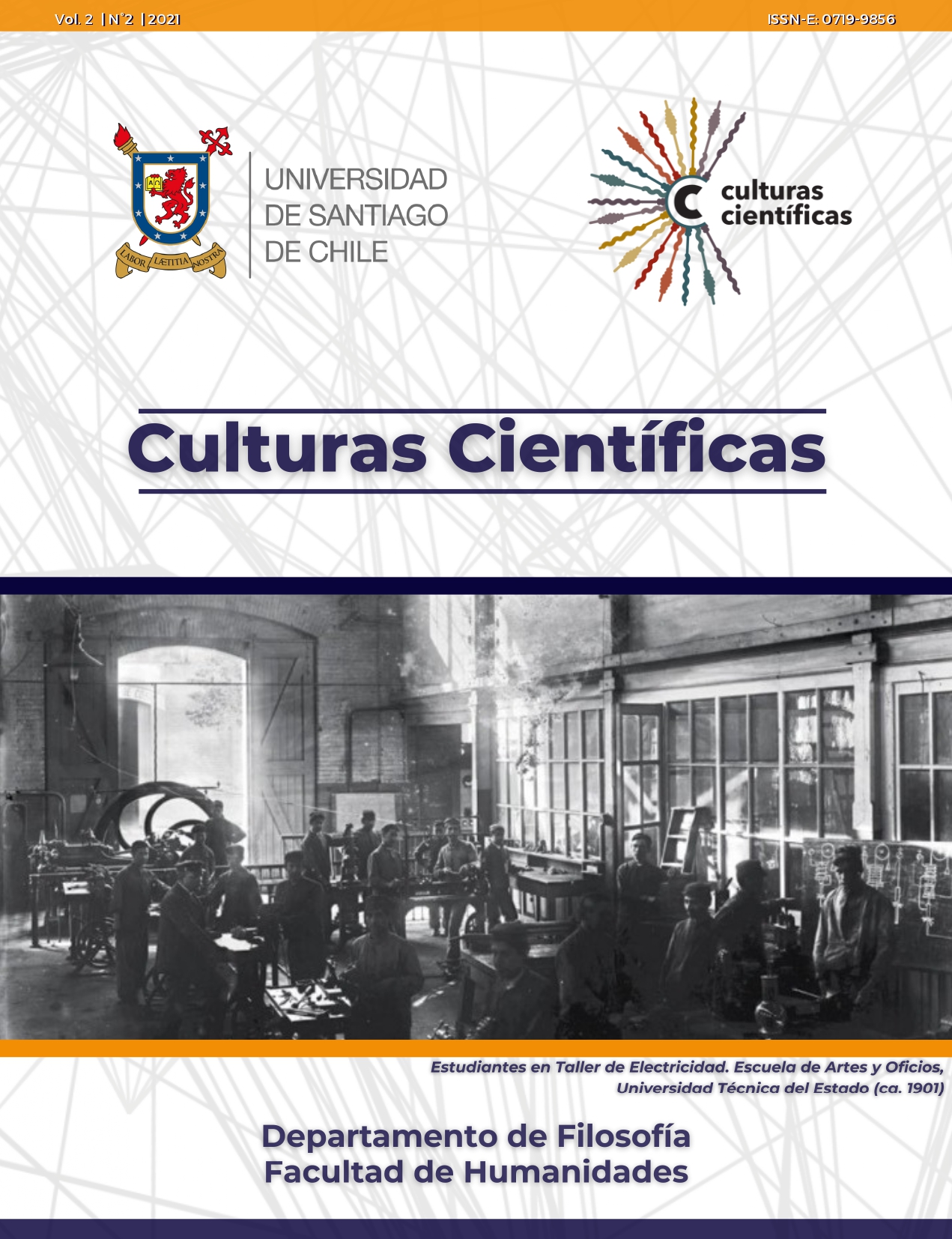Leibniz Reader of Locke
Spring and Elaboration of the New Essays on Human Understanding
DOI:
https://doi.org/10.35588/cc.v2i2.5261Keywords:
God, Leibniz, Locke, New Essays, Materialism, Metaphysics, Substance, TheologyAbstract
This contribution aims to examine and to describe the spring and elaboration of Leibniz’s New Essays on human understanding (1704 (?)). The interest of this study rests not only in attempting to reveal the historical and theorical articulation in which stages that precede the redaction itself of Leibniz’s New Essays take place -and which correspond to an almost ten-years period that coincide with the beginning of the late maturation of Leibniz’s philosophy-, but also in mitigating the strictly epistemological connotation that used to be attributed to, underlying the metaphysical and theological motivations Leibniz had to write his book in reply to Locke’s Essay concerning human understanding (1690).
Downloads
References
Álvarez, S. (1980). “Révélation, raison et “philosophia perennis”. Revue des Sciences philosophiques et théologiques, 64 (3): 333-348.
Anfray, J.-P. (2017). “Philosophie de l’esprit”. En M. Lærke, C. Leduc y D. Rabouin (dirs), Leibniz: lectures et commentaires (p.79-103). Paris: Vrin.
Antognazza, M. R. (2009). Leibniz: An intellectual biography. New York: Cambridge University press. doi: https://doi.org/hbgz
Beeley, P. (2006). “Leibniz et la tradition platonicienne: les mathématiques comme paradigme de la connaissance innée”, F. Duchesneau et J. Griard (dir.), Leibniz selon les Nouveaux Essais sur l’entendement humain (pp. 35-47). Montréal-Paris: Bellarmin-Vrin.
Beeley, P. (2009). “Approaching infinity: philosophical consequences of Leibniz’s mathematical investigations in Paris and thereafter”. En M. Kulstad, M. Lærke et D. Snyder (eds.), The philosophy of the young Leibniz (= Studia Leibnitiana Sonderhefte 35) (p.29-47). Stuttgart: Franz Steiner Verlag.
Belaval, Y. (1976). Études leibniziennes: De Leibniz à Hegel. Paris: Gallimard.
Belaval, Y. (1995). Leibniz: de l’âge classique aux lumières. Lectures Leibniziennes, présentées par M. Fichant. Paris: Beauchesne.
Berlioz, D. (2011). “Locke et la métaphysique”. M. de Gaudemar y P. Hamou (eds.), Locke et Leibniz: Deux styles de rationalité (p.109-129). Hildesheim-Zürich-New York: Georg Olms.
Bolton, M.-B. (2011a). “Vertu rationnelle et loi morale dans l’éthique de Locke, avec quelques réflexions sur les Nouveaux Essais de Leibniz”. En M. De Gaudemar y P. Hamou (eds.), Locke et Leibniz: Deux styles de rationalité (p.155-172). Hildesheim-Zürich-New York: Georg Olms.
Bolton, M.-B. (2011b). “Leibniz’s theory of cognition”. En B. Look (ed.), The Bloomsbury companion to Leibniz (pp. 136-158). London – New Delhi – New York – Sydney: Bloomsbury Publishing.
Boros, G. (2006). “Philosophie mécanique et philosophie morale dans les Nouveaux Essais”. En F. Duchesneau et J. Griard (dirs.), Leibniz selon les Nouveaux Essais sur l’entendement humain (p.265-275). Montréal-Paris: Bellarmin-Vrin.
Brown, G. (1995). “Leibniz’s moral philosophy”. En N. Jolley (éd.), The Cambridge companion to Leibniz (p.411-441). United Kingdom: Cambridge university press. doi: https://doi.org/dfxkn2
Brown, S. (1984). Leibniz. Great Britain: The Harvester press.
Brown, S. (2001). “The Leibniz-Toland debates on materialism and the soul at the court of the Queen of Prussia”. En H. Poser (éd.), VII. Internationaler Leibniz-Kongreß. Nihil sine ratione. Mensch, Natur und Technik im Wirken von G. W. Leibniz. Berlin, 10-14 septiembre. Hannover: Gottfried-Wilhelm-Leibniz-Gesellschaft.
Carr, H. W. (1960). Leibniz [primera edición 1929]. New York: Dover publications.
Castañeda, H. N. (1974). “Leibniz concepts and their coincidence salva veritate”, Noûs, 8 (4): 381- 398.doi: https://doi.org/fr9v5s
Curley, E.-M. (1972). “The root of contingency”. En H. Frankfurt (ed.), Leibniz: a collection of critical essays (p.69-97). Ney York: Anchor books.
Dagron, T. (2009). Toland et Leibniz: l’invention du néo-spinozisme. Paris: Vrin.
Dascal, M. (2008). G.W. Leibniz: The art of controversies. Traducción, edición, ensayo introductorio y notas de M. Dascal, Q. Racionero y A. Cardoso. Dordrecht: Springer.
de Buzon, F. (2004). “Leibniz, “mon système”. Les cahiers philosophiques de Strasbourg, (18): 7- 28.
de Gaudemar, M. y Hamou, P. (2011) (eds.). Locke et Leibniz : Deux styles de rationalité. Hildesheim- Zürich-New York: Georg Olms.
De Vleeschauwer, H.-J. (1968). “Perennis quaedam philosophia”, Studia Leibnitiana Supplementa, vol. 1 (= Akten des Internationalen Leibniz-Kongresses: Hannover: 14-19 November 1966) (p.102-122). Wiesbaden: Franz Steiner Verlag.
Devaux (2021). “L’or dans la boue » selon Leibniz: une maxime pour l’histoire de la philosophie?”. En Carraud (dir.), L’or dans la boue: Leibniz et les philosophies antiques et médiévales (p.15- 50). París: Sorbonne université presses
Di Bella (2021). “J’ay trouvé que la pluspart des sectes ont raison dans une bonne partie de ce qu’elles avancent, mais non pas tant en ce qu’elles nient: de l’usage leibnizien de l’histoire de la philosophie”. En Carraud (dir.), L’or dans la boue: Leibniz et les philosophies antiques et médiévales (pp. 50-69). París: Sorbonne université presses.
Duchesneau, F. (1994), “Une étude sur l’aristotélisme réformé. L’édition Bodéüs de la Correspondance Leibniz-Thomasius”. Dialogue, vol. XXXIII: p.457-472. doi: https://doi.org/bwnkfb
Duchesneau, F. y Griard, J (2006) (dirs.). Leibniz selon les Nouveaux Essais sur l’entendement humain. Montreal-Paris: Bellarmin-Vrin.
Fichant, M. (1995), “Leibniz et Toland : philosophie pour princesses ?”. Revue de synthèse, 2(3): 421-439. doi: https://doi.org/c9q295
Fichant, M. (2004). “La constitution du concept de monade ». Les cahiers philosophiques de Strasbourg, (18): 29-56.
Hamou, P. (2011). “Leibniz lecteur de Locke sur la “matière pensante””. En M. De Gaudemar y P. Hamou (eds.), Locke et Leibniz : Deux styles de rationalité (pp. 131-154). Hildesheim-Zürich- New York: Georg Olms.
Heinekamp, A. (1989). “L’état actuel de la recherche leibnizienne”. Les études philosophiques, 2: 139-160.
Heinemann, F.-H. (1945). “Toland and Leibniz”. The philosophical review, 54(5): 437-457. doi: https://doi.org/d95p75
Heinemann, F.-H. (1948). “Truths of reason and truths of fact”. The Philosophical review, 57(5): 458-480. doi: https://doi.org/c625k3
Jalabert, J. (1960). Le Dieu de Leibniz. Paris: Presses universitaires de France.
Jolley, N. (1984). Leibniz and Locke: A Study of the New Essays on Human Understanding. New York: Oxford Clarendon press.
Jolley, N. (2005). Leibniz. London and New York: Routledge.
Lærke, M. (2015). Les lumières de Leibniz : Controverses avec Huet, Bayle, Regis et More. Paris : Classiques Garnier.
Leduc, Christian (2006). “Définition et substance dans les Nouveaux Essais”. En F. Duchesneau y J. Griard (dirs.), Leibniz selon les Nouveaux Essais sur l’entendement humain (pp. 179-188). Montréal-Paris: Bellarmin-Vrin.
Leibniz, G. W. Die Philosophischen Schriften von Gottfried Wilhelm Leibniz, C. I. Gerhardt (ed.), 7 volúmenes, Berlin, 1875-1890: reimpresión Hildesheim, Georg Olms, 1960-1961 (citado como ‘GP’, seguido del número de tomo y página).
Leibniz, G. W. Mathematische Schriften, C. I. Gerhardt (ed.), 7 volúmenes. Hildesheim-New York: George Olms, 1971 (citado como ‘GM’, seguido del número de tomo y página).
Leibniz, G. W. Mittheilungen ans Leibniziens ungedruckten Schiften, G. Mollat (ed.). Leipzig : Verlag von H. Haessel, 1893 (citado como ‘M’, seguido del número de página).
Leibniz, G. W. Nouvelles lettres et opuscules inédits de Leibniz, précédés d’une introduction par Louis Alexandre Foucher de Careil, Paris, 1857: reimpresión Hildesheim-Zürich-New York: Georg Olms 2013. (citado como ‘F. de C.’, seguido por el número de página)
Leibniz, G. W. Sämtliche Schriften und Briefe, herausgegeben von der Preussischen Akademie des Wissenschaften [de ahora en adelante: Herausgegeben von der Berlin Branderburgischen Akademie der Wissenschaften und der Akademie der Wissenschaften in Göttingen], Darmstadt-Berlin, 1923 (citado como ‘A’, seguido del número de la serie (I-VIII), volumen y página).
Loemker, Leroy (1946). “Leibniz’s doctrine of ideas”. The philosophical review. 55(3): 229-249. doi: https://doi.org/fsqwh2
Mercer, C. (1990). “The Seventeenth-Century Debate Between the Moderns and the Aristotelian: Leibniz and Philosophia Reformata”. Studia Leibnitiana Supplementa, 27: 18-29.
Mercer, C. (1999), “The young Leibniz and his teachers”. En S. Brown (ed.), The young Leibniz and his philosophy (1646-76) (= Archives internationales d’histoire des idées/International archives of the history of ideas, vol. 166, p.19-40). Dordrecht-Boston-London: Kluwer academic publishers.
Mercer, C. (2001). Leibniz's Metaphysics: Its Origins and Development. Nueva York: Cambridge University Press. doi: https://doi.org/bw9bg2
Mercer, C. (2004). “Leibniz and his master: The Correspondence with Jakob Thomasius”. En P. Lodge (ed.), Leibniz and his Correspondents (p.10-46). United States: Cambridge University press. doi: https://doi.org/fbg7b3
Mercer, C. (2006). Leibniz on Mathematics, Methodology, and the Good: A Reconsideration of the Place of Mathematics in Leibniz's Philosophy. Early Science and Medicine, 11(4): 424-454. doi: https://doi.org/cfjdrn
Mercer, C. (2008). “The platonism at the core of Leibniz’s philosophy”. En D. Hedley y S. Hutton (eds.), Platonism at the origins of modernity: Studies on platonism and early modern philosophy (p.225-238). Springer. doi: https://doi.org/cd2dcd
Mondadori, F. (1988). “Leibniz on the distinction between Potentia Absoluta and Potentia Ordinata”. En I. Marchlewitz (éd.), Leibniz. Tradition und Aktualität: V. Internationaler Leibniz-Kongress. Vorträge (p.582-591). Hannover: Gottfried-Wilhelm-Leibniz-Ges.
Moreau, J. (1972), “Tradition et modernité dans la pensée de Leibniz”. Studia Leibnitiana, 4 (1): 48-60.
Parmentier, M. (2006), “Leibniz lecteur de Locke”. En F. Duchesneau et J. Griard (dir.), Leibniz selon les Nouveaux Essais sur l’entendement humain (p.11-18). Montréal-Paris: Bellarmin- Vrin.
Parmentier, M. (2008). Leibniz-Locke: une intrigue philosophique. Paris: Presses de l’Université Paris-Sorbonne.
Picon, M. 2003, “Vers la doctrine de l’entendement en abrégé : éléments pour une généalogie des Meditationes de cognitione, veritate, et ideis”. Studia Leibnitiana, 35(1): 102-132.
Poser, H. (2006). “Leibniz et la potentialité des idées innées: un problème modal”. En F. Duchesneau et J. Griard (dir.), Leibniz selon les Nouveaux Essais sur l’entendement humain (pp. 21-33). Montréal-Paris: Bellarmin-Vrin.
Rescher, N. (1981). Leibniz’s metaphysics of nature: a group of essays (= The university of Western Ontario series in philosophy of science, vol. 18). Dordrecht-Boston-London: D. Reidel publishing company.
Riley, P. (1996). Leibniz’ Universal Jurisprudence. Justice as the Charity of the Wise. Harvard university press, 1996. Cambridge: Massachusetts – London: England: Harvard University press.
Riley, P. (2003). “Leibniz’s Méditation sur la notion commune de justice”. The Leibniz review, 13: 67-81. doi: https://doi.org/fz8g5k
Riley, P. (2006). “Leibniz on natural law in the Nouveaux Essais”. En F. Duchesneau y J. Griard (dirs.) Leibniz selon les Nouveaux Essais sur l’entendement humain (p.277-289). Montreal- Paris: Bellarmin-Vrin.
Rogers, J. (1992). “Contexte des rapports intellectuels entre Hobbes et Locke” (P. Lurbe trad.). Archives de philosophie, 55 (4): 531-551.
Russell, B. (1900). A critical exposition of the philosophy of Leibniz. Cambridge: Cambridge University press.
Rutherford, D. (1996). “Demonstration and reconciliation: the eclipse of the geometrical method in Leibniz’s philosophy”. En R. Woolhouse (ed.), Leibniz’s ‘New System’ (p.181-201). Olschki.
Rutherford, D. (1998). “Leibniz and mysticism”. En A. Coudert, R. Popkin y G. Weiner (eds.), Leibniz, mysticism and religion (= Archives internationales d’histoire des idées/International archives of the history of ideas, vol. 158, p.22-46). Dordrecht : Kluwer academic publishers.
Schmitt, C.-B. (1966). “Perennial Philosophy: From Agostino Steuco to Leibniz”. Journal of the History of Ideas, 27 (4): 505-532. doi: https://doi.org/fcc5nr
Schrecker, P. (1951), “Leibniz and the Timaeus”. The review of metaphysics, 4(4): 495-505.
Silva, C. (2020). “Substance, vérité et métaphysique dans les Nouveaux Essais: Un échantillon prismatique de la perennis quaedam philosophia de Leibniz”. Scripta Philosophiæ Naturalis, (18): 27-60.
Tricaud, F. (1987). “Hobbes et Locke: convergences et divergences”. XVII-XVIII. Bulletin de la société d’études anglo-américaines des XVIIe et XVIIIe siècles, (25): 77-87.
Wilson, C. (1989). Leibniz’s metaphysics: A historical and comparative study. Great Britain: Manchester University press. doi: https://doi.org/hbg4
Wilson, C. (2006). “The problem of materialism in the Nouveaux Essais”. En F. Duchesneau y J. Griard (dirs.) Leibniz selon les Nouveaux Essais sur l’entendement humain (p.249-264). Montreal-Paris: Bellarmin-Vrin.
Wilson, M. (1967). “Leibniz and Locke on “first truths””. Journal of the history of Ideas, 28(3): 347-366. doi: https://doi.org/dmpjgt
Downloads
Submitted
2021-11-19Published
Issue
Section
License
Copyright (c) 2021 Camilo Silva

This work is licensed under a Creative Commons Attribution 4.0 International License.











